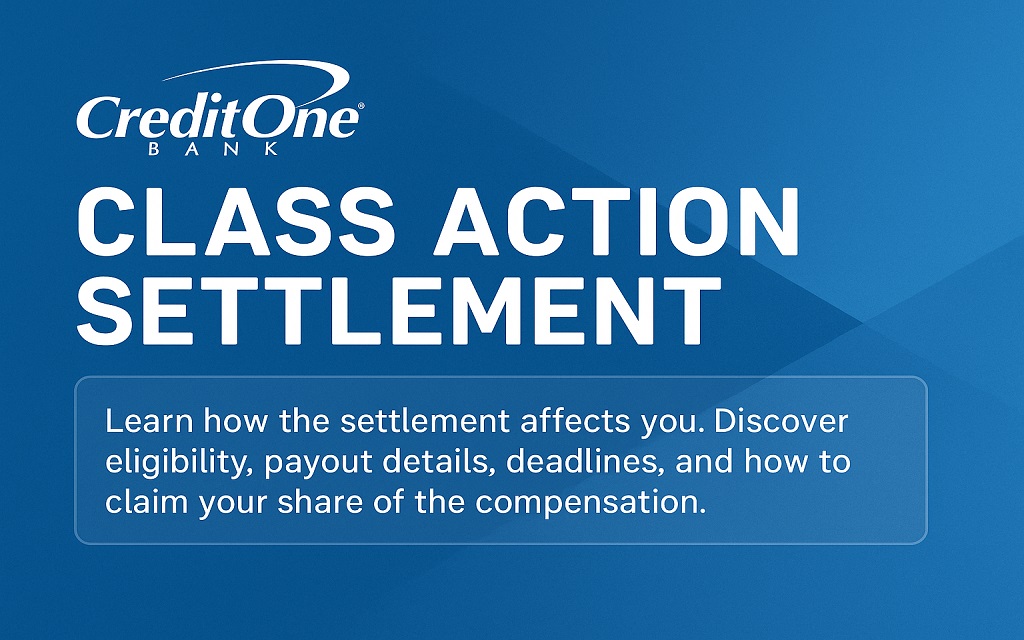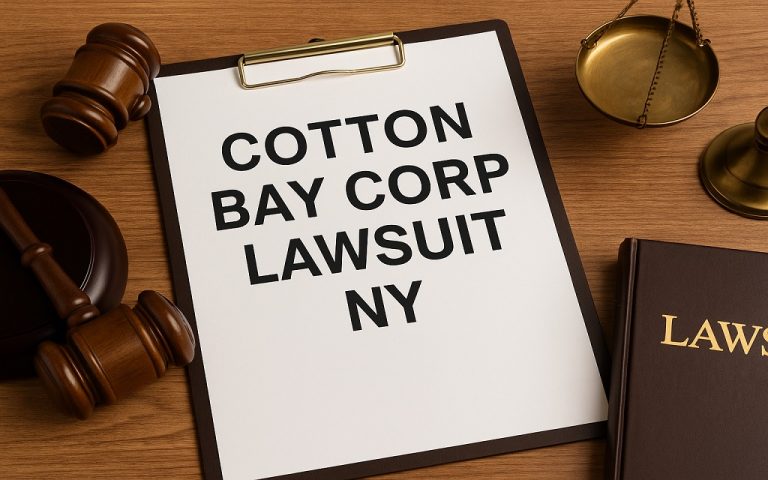Updated: October 18, 2025
Status: No court-approved settlement. No official claims site
You want facts because you deserve them. The federal docket lists Whitehead v. Credit One Bank, N.A., case No. 2:25-cv-01008. The case sits in the District of Nevada. The docket shows normal case activity. No judge has approved any class settlement. No preliminary approval order exists, and no final approval order exists. That is the present record.
Media posts claim a $14 million fund. Those posts do not cite a docket order. They do not link to a court notice. They do not show an administrator site. Treat those articles as unverified until the court acts. Responsible coverage points to documents, not rumors.
One order on the docket extends Credit One’s time to respond. That order is routine. It does not create a settlement. It does not name any claims website and does not define any class. You will not find a valid claims portal on the docket today. You should avoid third-party forms and upload fields.
Check any claim on this topic against the record. Start at PacerMonitor’s public view of the case. Open the filed order that extends time. Compare any blog post against those entries. Trust the court file first.
How can you confirm any Credit One settlement before you act?
Follow a three-step test. Step one: look for a preliminary approval order on the docket. That order sets the class definition. It lists deadlines for claims, opt-outs, and objections. It sets the fairness hearing. Absence of that order means no settlement today. Step two: find a court-approved notice. That notice mirrors the order. It gives dates, definitions, and instructions. Step three: use the official administrator site only. Courts link administrators from the docket. Common firms include Epiq, Kroll, JND, Angeion, and Rust.
See anything else online? Pause. Compare every claim to the docket. Do not enter personal data on unofficial portals. Do not email IDs to random inboxes and do not send scans to blogs.
You can validate the Credit One case yourself. Open the public case overview. Review the latest entries. Open the extension order PDF. Confirm the lack of an approval order. Keep the docket bookmarked. Recheck before you act. Facts beat headlines.
How can you verify any “Credit One Bank Class Action Settlement” safely?
| Step | What to check | Why it matters | Where to look | Live example |
|---|---|---|---|---|
| 1 | A preliminary approval order on the docket | Proves a judge approved notice and a claims process | Case docket for Whitehead v. Credit One Bank, N.A., No. 2:25-cv-01008 (D. Nev.) | Public docket shows no approval order today. PACER Monitor |
| 2 | A court-approved notice (long form) | Lists the class, deadlines, and hearing date | Same docket entry that grants preliminary approval | No notice appears on the docket. PACER Monitor |
| 3 | A named administrator site | Real settlements use Epiq, Kroll, JND, Angeion, or Rust | Linked directly from the court docket or notice | No administrator link appears. PACER Monitor |
| 4 | Recent orders that change status | Shows if a settlement later emerges | “Recent filings” on the docket | Only an extension of time order appears. Not an approval. Justia Law+1 |
| 5 | Governing TCPA rules | Confirms what conduct the law covers | FCC declaratory ruling on AI voices | AI voices count as “artificial or prerecorded.” Effective now. Federal Communications Commission |
| 6 | Comparable TCPA outcomes | Sets realistic expectations | Appellate opinions or approved settlements | Krakauer v. Dish affirmed >$61M; Capital One prelim. approved $75.5M. National Law Review+3Fourth Circuit Court+3Justia Law+3 |
What does the TCPA require in robocall cases today?
The TCPA protects your phone privacy. The statute restricts autodialed calls and prerecorded voices to cell phones without consent. Courts and the FCC read that rule strictly. A 2024 FCC ruling closed a new loophole. The agency held that AI-generated voices count as “artificial or prerecorded voice.” Companies need your prior express consent before those calls. Telemarketing needs prior express written consent. Regulators can fine violators. Carriers can block violative traffic. You can sue under the TCPA.
This policy reacted to rising synthetic-voice abuse. Election robocalls showed the harm. Newsrooms covered the ruling and its immediate effect. State attorneys general gained stronger tools. The FCC has since brought cases and fines. That enforcement wave continues.
You should save proof if calls targeted you. Screenshots of texts help. Voicemails help. Caller IDs and timestamps help. Evidence supports private claims and agency complaints. Keep notes on any opt-out request and any calls that followed.
The rule is simple. Consent controls most outcomes. Lack of consent creates risk for callers. Evidence builds leverage for you.
What do real TCPA outcomes show about payouts and proof?
Look at decided matters. Krakauer v. Dish Network produced a class trial and a defense loss. The Fourth Circuit affirmed. The judgment exceeded $61 million after adjustments. The opinion explains the class proof and the Do-Not-Call violations. That case shows serious exposure for repeat violations. It also shows courts will uphold TCPA trials. Primary documents tell that story.
Historic settlements confirm scale as well. Capital One agreed to $75.5 million in 2014. The court granted preliminary approval in N.D. Ill. The docket included notices, deadlines, and claims steps. That case remains a benchmark for large TCPA funds. Law firms and industry outlets documented the approval path.
These examples matter. They share traits that rumors lack. Each has a case caption. Each has docketed orders. Also, each has a long-form notice. Each has a named administrator. You can read the PDFs. You can track timelines. Use these traits as your litmus test in every new claim. Evidence should lead your decision.
How should you protect your rights after unwanted Credit One calls?
Act methodically. First, preserve evidence. Save voicemails. Save screenshots of texts. Export call logs if possible. Note dates and times. Record any opt-out request you sent. Keep every letter and email from Credit One. Store files in two places.
Next, evaluate consent. Ask if you agreed to calls to your cell. Check application forms and account terms. Note any number changes or recycled numbers. Note any revocation you sent. Lack of consent strengthens claims. Calls after revocation raise risk further.
Then, consider counsel. A consumer-rights attorney can assess exposure and options. Many firms review cases at no cost. Legal advice protects deadlines and strategy. You can also complain to regulators. The FCC accepts robocall complaints online. State attorneys general collect complaints as well.
Finally, ignore rumors. Do not file on unofficial portals. Wait for a docketed order and a named administrator. Recheck the Credit One docket before any action. Open the extension order again. Confirm no approval order exists. Trust documents over headlines. Patience prevents harm.
Frequently Asked Questions About the Credit One Bank Class Action Settlement
Is the Credit One Bank Class Action Settlement real?
No. The court has not approved any settlement. The docket lists only procedural orders. Always verify information before acting.
Where can I find the official claims website?
There is none right now. The court has not issued an approval order or notice linking to any portal.
Why do blogs say there’s a $14 million fund?
Those claims repeat earlier posts without evidence. No judge has confirmed that number. Ignore any site without citations.
Can I still file a claim now?
No. A valid claim form does not exist. Wait until the court posts a real notice and web link.
What should I do if I received robocalls from Credit One?
Save your call logs and voicemails. Record dates and opt-outs. Talk to a TCPA attorney about your rights.
What is the TCPA?
The Telephone Consumer Protection Act stops unwanted calls and texts without consent. It also covers AI-generated voices.
How do I confirm updates about this case?
Search the federal docket for Whitehead v. Credit One Bank, N.A. No. 2:25-cv-01008 (D. Nev.). Bookmark it and recheck weekly.
When could a real settlement appear?
If the parties reach agreement, the court will post a preliminary approval order first. Until then, nothing is official.
Are AI robocalls now illegal?
Yes. The FCC confirmed AI voices count as prerecorded calls. Companies must get your consent first.
How does this case compare to others?
Dish Network paid $61 million after trial. Capital One settled for $75.5 million. Each had full court approval.
Conclusion: Credit One Bank Class Action Settlement—check facts before you file
The Credit One Bank Class Action Settlement does not exist today in court records. The Nevada docket lists no preliminary approval. The docket lists no final approval. The docket lists no claims site. Media posts cite numbers without orders. You should verify every claim against the docket before you act. Look for a judge’s order, a court notice, and a named administrator. File only through links tied to those records. Evidence and patience protect your privacy and your rights. Recheck the docket as the case moves. Facts will appear there first.
Musarat Bano is a content writer for JudicialOcean.com who covers lawsuits, legal news, and general legal topics. Her work focuses on research-based, informational content developed from publicly available sources and is intended to support public awareness. She does not provide legal advice or professional legal services.




